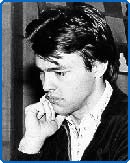(81) Status... Grandmasters as the world's fastest talkers and Drs Charles Hunter and Chris Humphreys
In March 1992 I visited Roderick Main in Lancaster. One of the many topics we discussed was "de-glamourisation". For instance, much is made of outstanding sporting figures’ prowess and status.
But is it really so surprising that those who, for example, are saturated in an activity from early childhood go on to excel at it? The experiment with the Polgar sisters of Hungary, all three of whom became Grandmasters, was a case in point.
Roderick surprised me by saying that he himself had been quite a good chessplayer. He had been taught to play by a friend of his father’s, Dr Charles Hunter, and had even once held Nigel Short to a draw when he had been one of his opponents in a simultaneous display.
But not long after that he had ceased to take so great an interest in the game.
He also mentioned, along with the theme of silly prominence, that the man who taught him chess was featured in The Guiness Book Of Records as the fastest talker in the world. In 1991 a colleague at Cornhill Publications, Chris Humphreys, heard me, as I occasionally do, rush my speech so that it all came tumbling out incomprehensibly.
"James Plaskett: the world’s fastest talker", he observed.
Tele sales people frequently adopt soubriquets and sometimes bogus titles too. The title lends a certain authority to their pitch, and they are particularly apt to call themselves "Doctor." The alias which Humphreys most often adopted was Dr Charles Hunter.
... ... ... ,
On November 9th 2005 my wife gave a reading to the Torrevieja Writer´s Circle. It was mentioned that she was married to a chess Grandmaster, whereupon a Mrs J. Leach asked what it was like living with a chessplayer, as she knew of one, Dr Charles Hunter, who had been splendidly eccentric.
My book Coincidences having been mentioned shortly before this, I chipped in that this very man was in its expanded version. Hunter was best known in the chess world as a Grandmaster of Correspondence Chess, which is a quite different skill to over the board play.
Ms Leach added that the late Dr Hunter had been a GP for two of her children in the Rochdale area. I said that I had referred to him in the context of rapidity of speech, which I had assumed to have been an acquired knack, but she said that he just could not help it and that patients had had difficulty in following him.
I began to recount the details of the earlier coincidence involving him, but as I mentioned Chris Humphreys she interjected that she knew him and that he was a Medical Consultant also in that part of North East England.
I had to explain that this had to be quite another gentleman of the same name; a legitimate Dr.
But is it really so surprising that those who, for example, are saturated in an activity from early childhood go on to excel at it? The experiment with the Polgar sisters of Hungary, all three of whom became Grandmasters, was a case in point.
Roderick surprised me by saying that he himself had been quite a good chessplayer. He had been taught to play by a friend of his father’s, Dr Charles Hunter, and had even once held Nigel Short to a draw when he had been one of his opponents in a simultaneous display.
But not long after that he had ceased to take so great an interest in the game.
He also mentioned, along with the theme of silly prominence, that the man who taught him chess was featured in The Guiness Book Of Records as the fastest talker in the world. In 1991 a colleague at Cornhill Publications, Chris Humphreys, heard me, as I occasionally do, rush my speech so that it all came tumbling out incomprehensibly.
"James Plaskett: the world’s fastest talker", he observed.
Tele sales people frequently adopt soubriquets and sometimes bogus titles too. The title lends a certain authority to their pitch, and they are particularly apt to call themselves "Doctor." The alias which Humphreys most often adopted was Dr Charles Hunter.
... ... ... ,
On November 9th 2005 my wife gave a reading to the Torrevieja Writer´s Circle. It was mentioned that she was married to a chess Grandmaster, whereupon a Mrs J. Leach asked what it was like living with a chessplayer, as she knew of one, Dr Charles Hunter, who had been splendidly eccentric.
My book Coincidences having been mentioned shortly before this, I chipped in that this very man was in its expanded version. Hunter was best known in the chess world as a Grandmaster of Correspondence Chess, which is a quite different skill to over the board play.
Ms Leach added that the late Dr Hunter had been a GP for two of her children in the Rochdale area. I said that I had referred to him in the context of rapidity of speech, which I had assumed to have been an acquired knack, but she said that he just could not help it and that patients had had difficulty in following him.
I began to recount the details of the earlier coincidence involving him, but as I mentioned Chris Humphreys she interjected that she knew him and that he was a Medical Consultant also in that part of North East England.
I had to explain that this had to be quite another gentleman of the same name; a legitimate Dr.



Comments